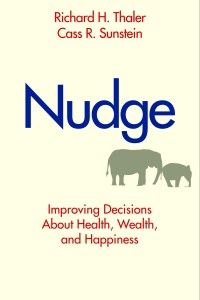It’s pretty rare that a single article can change how you think about an issue. For me, the Times’ take on business’ use of analytics to boost sales did just that (How Companies Learn Your Secrets). The article describes how Target (a “home town” company for yours truly) uses analytics to lead customers to new products and services. Most interesting was that their model was largely proactive — their goal was to look ahead to a particularly susceptible points in a customer’s life, and target specific promotions during that short period of time.
 The approach reminded me a great deal of Thaler and Sunstein’s book, Nudge: Improving Decisions about Health, Wealth, and Happiness. The authors argue that benevolent social engineers can use cues to “nudge” people towards good decisions (for example, putting health foods in easy reach at a cafeteria). While some have criticized the work for perhaps a paternalistic approach, I think their ideas might stimulate useful design. Rather than put no thought into a design (or worse, to base the design purely on profit), a designer might look for points at which we make decisions — and use those opportunities to steer people in the right direction. This might be especially powerful when the design is backed by data.
The approach reminded me a great deal of Thaler and Sunstein’s book, Nudge: Improving Decisions about Health, Wealth, and Happiness. The authors argue that benevolent social engineers can use cues to “nudge” people towards good decisions (for example, putting health foods in easy reach at a cafeteria). While some have criticized the work for perhaps a paternalistic approach, I think their ideas might stimulate useful design. Rather than put no thought into a design (or worse, to base the design purely on profit), a designer might look for points at which we make decisions — and use those opportunities to steer people in the right direction. This might be especially powerful when the design is backed by data.
Most of the models of analytics that I have heard of in the realm of Higher Education are reactive. A student gets a bad grade, or is not logging in to the learning management system, and then someone contacts the student to attempt to intervene (after the fact). I think Target’s use of “analytics to nudge” might be a better model. If you’re collecting analytic data on student interactions, why not use that data to help them make better decisions. Perhaps an incentive, like a badge, could inspire a lagging student to visit the library. Perhaps some students would find links to useful resources (like counseling or help with study skills) after they trigger some kind of early-early warning.
I think a more proactive and positive model of analytics would be much more productive than a reactive or fix-it-after-it-has-become-a-problem approach. If only schools could devote the same kinds of resources to these efforts as our colleagues in the private sector.
Edit
Here’s Stephen Colbert’s humourous take on the story (on Ash Wednesday):
The Colbert Report
Get More: Colbert Report Full Episodes,Political Humor & Satire Blog,Video Archive